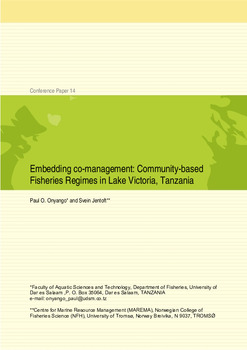Embedding co-management: community-based fisheries resource management regime in Lake Victoria, Tanzania

Citation
Onyango, P.O.; Jentoft, S. (2007). Embedding co-management: community-based fisheries resource management regime in Lake Victoria, Tanzania. In Dickson, M. and A. Brooks (eds.) Proceedings of the CBFM-2 International Conference on Community Based Approaches to Fisheries Management, Dhaka, Bangladesh, 6-7 March. The WorldFish Center - Bangladesh Office
This paper discusses fisheries management reforms through involving local level institutions (LLFI). It is based on studies which were undertaken on Tanzania’s Lake Victoria fishery where LLFIs were established through the formation of Local enforcement Units, later named Beach Management Units (BMU), between 1998 and 2002. The paper takes the view that the overfishing problems that confront Tanzania’s fisheries management authorities are best understood from a social science perspective. The argument is that most communities’ values and institutions are embedded in their societies. The same is however, not true for externally originated management tools and systems as is the case with BMUs. This paper shows that the BMUs established between 1998 and 2002, were not sufficiently grounded in their socio-cultural environment and this led them to be unsustainable and ineffective. The paper demonstrates that this mismatch by examining the different historical and social contexts in which livelihoods such as fishing emerged and was carried out. These social contexts generated social values that explain the individual behaviour of community members. It is such values that communities always strive to maintain in any activity including fishing. Thus, when confronted with situations that threaten these values, communities strategize or negotiate ways to cope. The coping strategies of two communities riparian to the lake are discussed. The paper therefore proposes a framework for making these units ‘fit’ local conditions in order to make them effective and sustainable so as to reform fisheries management.
Permalink
Date Available
Type
Publisher
Research Themes
Language